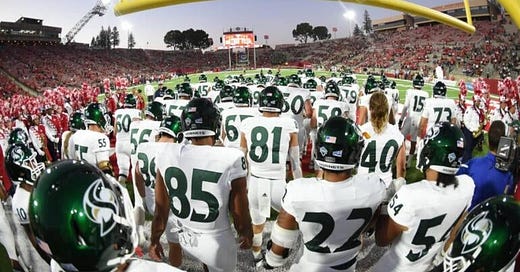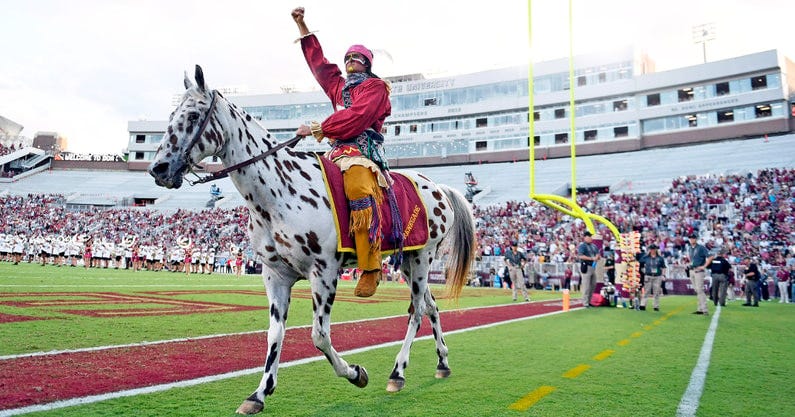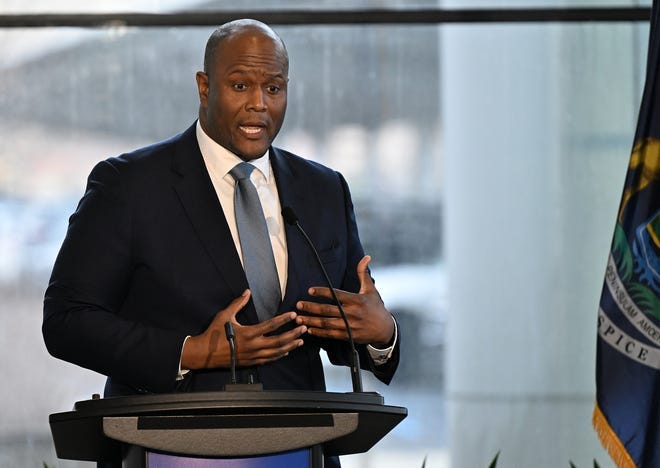Sac State's Conference Exit, FSU's Cash Fix, Michigan's New House Bill, ICYMI, & More | NIL Newsletter #338
Today’s Thursday newsletter includes highlights from this week, important news from last week, and what to watch for.
This Thursday’s Newsletter Includes:
1. Sacramento State’s conference exit & FBS waiver drama
2. Florida State unlocks $20.5 million with a Board-of-Governors cash fix
3. Quick Hitters
4. ICYMI: Penn State and UCLA Take Private Equity Deals with Elevate
5. What to Watch For
🏆Major News
Sacramento State Bets the Program on an FBS Rebrand—But the NCAA Might Say “No.”
Big Sky out, Big West in … football nowhere! Sac State has formally notified the Big Sky it will depart on June 30, 2026, and is poised to join the non-football Big West the very next day. That leaves football homeless unless the NCAA grants its waiver to reclassify straight to FBS.
The FBS Oversight Committee recommended denial last week; the Division I Council has final say within days. Current rules demand a “bona-fide invitation” from an FBS league—Sac State has none, meaning 2026 independence is the fallback.
So, what is the Sac12 grand plan? A booster group has pledged: $50M in NIL commitments, a 25k-seat stadium, a 6k-seat arena, and $5.25M in realignment fees—explicitly to chase a future Pac-12 invite. Major portal haul (40 DI transfers, QB Jaden Rashada) and splash hires (HC Brennan Marion, HC Mike Bibby) were sold on that vision.
This does pose legal & financial risk. If the Council says “no,” Sac State’s FBS move stalls for an entire cycle—all the new NIL promises were made while it was still an FCS budget ($1M football ops). Players could bolt without penalty; donors could cool; and scheduling as an FCS independent would force cash-draining D-II “buy games.”
So why does the waiver matter on a system-wide basis? Liberty used the same loophole in 2017; the Oversight Committee now calls that “a different era.” A denial would cement the bona-fide-invite rule and chill other mid-major ambitions, reinforcing the ACC/Big 12/MWC gatekeeping power over upward mobility, and spotlighting antitrust questions about conference control over market entry.
Florida State Gets a Three-Year Green Light to Tap “Auxiliary Funds” for Athlete Revenue Sharing
Public universities in Florida can now redirect up to $22.5M annually from auxiliary units (housing, parking, bookstores) to cover House-era revenue sharing. The waiver runs through FY 2028. So what does this mean?
AD Michael Alford told trustees FSU will fund “the highest level” ($20.5M Year 1, indexed 4% annually) to stay top-tier in football recruiting and CFP contention. Auxiliary access bridges the gap until (a) the ACC settlement bumps FSU’s media share by ~$15-20 M and/or (b) a move to another league.
Legal takeaways:
State-funded revenue share: Florida joins Texas and Oregon in rewriting statutes/board regs so public money can flow directly to athlete payroll—an implicit waiver of traditional “self-support” rules that once walled off athletics from housing & fee revenue.
Competitive balance ripple: Private-school rivals get donor checks; public Florida schools now have quasi-state subsidies, potentially drawing Title IX scrutiny over whether auxiliary money (student fees) disproportionately benefits male-dominated football.
Budget optics vs. lawsuits: The carve-out expires in 2028—exactly when the $20.5 M cap could climb past $25 M—and the state can yank it if legislative sentiment flips, leaving FSU to absorb long-term payroll internally or risk breach-of-contract claims from athletes.
My takeaway here is that utilizing the $22.5M annually from auxiliary units (housing, parking, bookstores) to cover House-era revenue sharing is a way to utilize the tuition of other students to create a net zero revenue loss for the collegiate athletic department since that money was supposed to be premised on the new revenue sharing model.
📌Quick Hitters
South Carolina QB LaNorris Sellers nixes $8M portal bid. The sophomore Heisman hopeful stayed after a Garnet Trust re-up; his story underscores that schools will still need to be competitive in-house offers even with caps, because external collectives can still tempt stars—if Deloitte deems the number “fair.” 🔗 LINK
House Settlement: NCAA counsel signals “Day 1 execution,” calls Title IX appeal a long-shot. Lead lawyer Rakesh Kilaru told SBJ the 10-year plan “opens the door for substantial new benefits,” but roster limits were essential for competitive equity; failure standard on appeal is “abuse of discretion—very high.” Translation: the 9th Circuit is unlikely to derail the July 1 launch, but compliance bumps are expected. 🔗 LINK
Teamworks becomes a sports-tech unicorn with a $235 M Series F at a $1 B+ valuation. Dragoneer’s cash will turbo-charge AI features across the Operating System for Sports—already used by 99% of DI departments. Expect new modules to plug directly into Deloitte’s NIL Go API, giving ADs a single dashboard for payroll, cap ledgers, and clearinghouse alerts. 🔗 LINK
The impending salary-cap crash. Hoops HQ reports Opendorse modeling shows SEC men’s hoops payrolls dropping from $10-12 M to ≈ $3.5 M once the $20.5 M cap + Deloitte FMV checks hit. Florida coach Todd Golden warns players will see “10-20% of last year’s money.” Antitrust suits are likely, but Judge Wilken’s 50-50 revenue-share logic gives schools cover for now. 🔗 LINK
Mizzou’s $31.7 M NIL binge before July 1. Open-records invoices show 64% to football, 24% to men’s hoops, and a $10 M June sprint to “front-load” contracts before the cap. Expect these figures to haunt Title IX depositions when revenue sharing locks in. 🔗 LINK
Georgia’s ’26 class flex + $18.3 M NIL budget. Four-star OT Ekene Ogboko commits; On3 pegs UGA’s 2025 NIL spend fourth nationally. His $433k valuation highlights how blue-bloods will allocate their post-cap “side-deal” bandwidth. 🔗 LINK
JMU reveals post-House roster math. Dukes publish 2025-26 roster limits (e.g., baseball 34, lacrosse 36, football 105) and add 15 scholarships without layoffs—proof that mid-majors are absorbing costs via incremental roster growth, not wholesale cuts. 🔗 LINK
ICYMI
Penn State and UCLA Take Private Equity Deals with Elevate
On June 10, it was reported that Elevate Sports Ventures had launched a new $500 million initiative to bring private investment into college athletics, backed by Velocity Capital and the Texas Permanent School Fund.
The report named Penn State and UCLA as Elevate’s first two institutional partners, citing sources who claimed both schools had signed on to receive direct capital funding for athletic infrastructure, NIL programs, and revenue generation platforms.
The reaction was immediate: both schools issued swift denials. UCLA Athletic Director Martin Jarmond stated that while Elevate is a longtime ticketing and fan experience partner, there is “no private equity arrangement” or capital partnership in place.
Penn State followed suit, clarifying that Elevate only handles ticketing and sales operations, and refuting any agreement to accept outside capital as described in the article.
The controversy underscores growing tension around the use of private equity in college sports, particularly as schools face mounting costs from the House v. NCAA settlement, NIL compliance, and escalating media rights demands.
While Elevate maintains that its model is non-controlling and designed to provide strategic growth capital, many administrators and observers worry it could erode institutional autonomy and open the door to long-term commercial influence over public athletic programs.
What To Watch For: Michigan’s HB 4643 & the First State vs. Clearinghouse Showdown
The House Higher Education Committee is expected to give the bill its first reading before the July 1 House-settlement launch. If it advances, floor debate could come in the August session.
This bill would bar Michigan colleges from reporting NIL contracts to the NCAA or Deloitte’s NIL Go, block universities from assisting any investigation, and prohibit athletic associations from penalizing athletes or schools for non-compliance.
This matters because Big Ten schools (MSU, Michigan) have already signaled they will sign the league’s “affiliation agreement,” promising to abide by NIL Go and CSC arbitration—even if state law conflicts. If HB 4643 passes unchanged, those schools would face a direct conflict between state statute and a private-law contract, setting up an immediate Supremacy-Clause and antitrust test case.
Some possible outcomes include – (1) The bill stalls after July 1, leaving Deloitte unchallenged in Michigan; (2) it passes but the governor amends/state senate softens the anti-reporting language; (3) it passes intact, triggering a lawsuit from the Big Ten or the CSC seeking injunctive relief and fast-track federal review.
Watch for – Rep. Joe Tate (bill sponsor/former MSU OL), Michigan AG Dana Nessel (enforcement posture), Big Ten legal counsel, and Deloitte’s compliance team to act as they prepare contingency protocols for “non-reporting” states.
Thanks for Reading!
Keep up to date on all of our newsletters and content by checking out past Optimum Sports Consulting Newsletters and following us on Twitter!
Thanks for reading Optimum Sports Consulting Newsletter! Subscribe for free to receive new posts and support my work.










